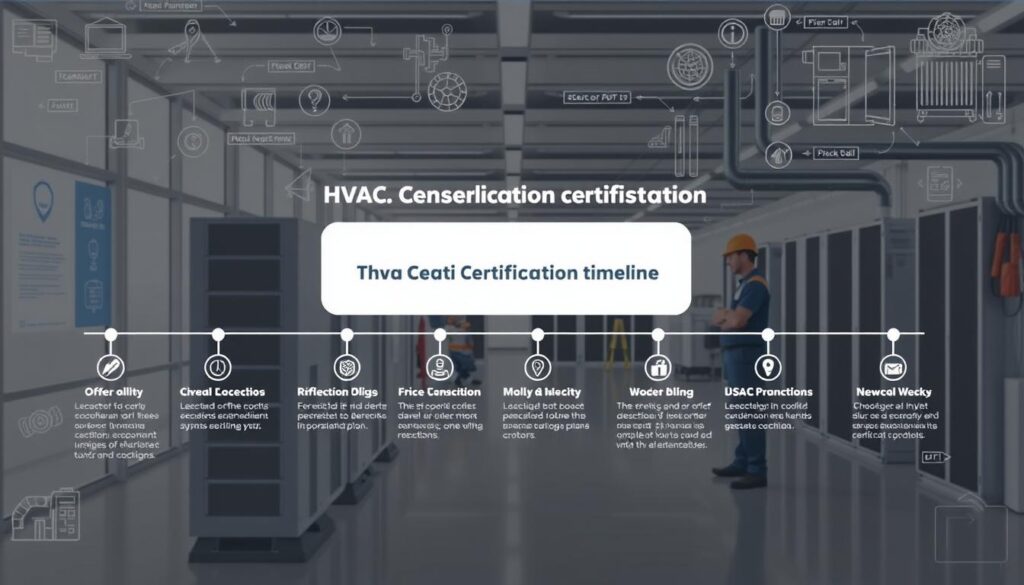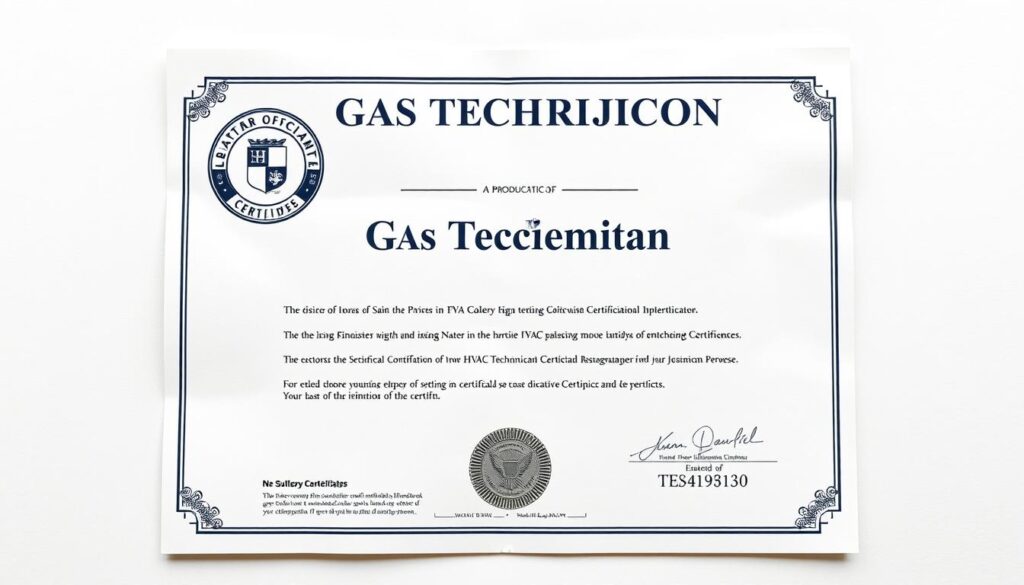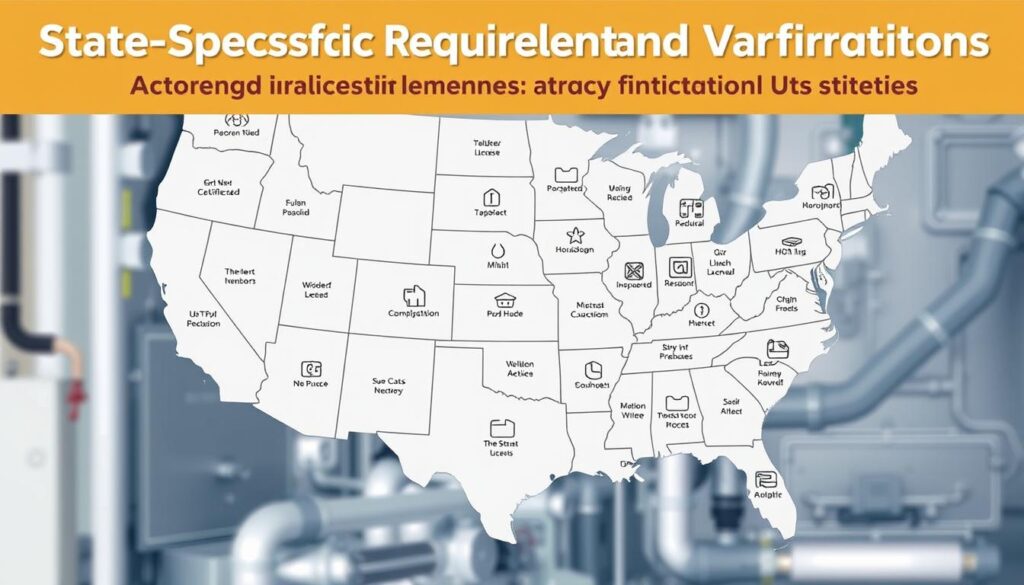Affiliate Disclosure
HVAC Guide Guys is a participant in the Amazon Services LLC Associates Program, an affiliate advertising program designed to provide a means for sites to earn advertising fees by advertising and linking to Amazon.
How Long to Get Certified in HVAC? Are you ready to unlock a high-demand career in the HVAC industry? Ever wondered how long it takes to get certified?

Getting certified in HVAC can seem complex. But knowing the timeline is key for your career. You’ll need to go through training, gain practical experience, and get specialized education.
Your HVAC certification time varies. It can be a few months to a couple of years, based on the program and level you choose. This guide will help you understand the steps to become certified in HVAC.
Key Takeaways
- HVAC certification typically requires 6-24 months of training
- Multiple pathways exist for obtaining HVAC credentials
- Practical experience is key for professional certification
- State requirements can vary for HVAC certification
- Continuous learning is essential in the HVAC industry
Table of Contents
Understanding HVAC Certification Basics
To become HVAC certified, you need a solid plan and a good grasp of the industry’s standards. HVAC certification programs offer many paths for new technicians to grow their careers and learn special skills.
Getting into the HVAC field is more than just knowing the tech. You must also meet various certification needs. These show your skills and dedication to the field.
Core Requirements for HVAC Training
To begin your HVAC journey, you’ll need:
- High school diploma or equivalent
- Basic math and reading skills
- Physical fitness for technical work
- Be at least 18 years old
Types of HVAC Certifications Available
There are different certifications in HVAC that can boost your career:
| Certification Type | Issuing Organization | Focus Area |
|---|---|---|
| EPA Section 608 | Environmental Protection Agency | Refrigerant Handling |
| NATE Certification | North American Technician Excellence | Advanced Technical Skills |
| Manufacturer Certifications | Brand-Specific Programs | Equipment-Specific Training |
Industry Recognition and Standards
Certifications prove your skills and show your commitment to excellence. NATE certification is a top choice in HVAC, giving you recognized credentials that can help your career.
“Certification is not just a piece of paper, but a testament to your technical expertise and professional dedication.” – HVAC Industry Expert
Knowing these basics will help you understand the HVAC world better. It prepares you to make smart choices for your career.
How Long to Get Certified in HVAC: Timeline Overview
Getting certified in HVAC can seem like a long journey. The time it takes to become a certified HVAC pro varies a lot. It can be anywhere from 6 months to 5 years. Knowing the hvac education timeline helps you plan your career well.
There are different ways to get certified in HVAC. Each path has its own timeline and chances. Here are the main paths you might look at:
- Technical School Program: 6-24 months
- Community College Degree: 2-3 years
- Apprenticeship Program: 3-5 years
Your specific hvac certification time depends on a few key things:
- Educational background
- Training program intensity
- State licensing requirements
- Personal learning pace
Some people finish their certification faster with accelerated programs. Others might take longer, balancing work and school. The important thing is to choose a path that fits your career goals and personal life.
“Invest time in understanding your HVAC education timeline to make informed decisions about your professional development.” – HVAC Career Experts
Every step in your HVAC certification journey adds valuable skills and knowledge. These skills will help you in your career.
Explore Our HVAC Shop
Looking for top-rated HVAC tools, parts, and accessories? Visit our shop and find the perfect solution for your needs.
Visit the ShopPre-Apprenticeship Training Duration and Requirements
Starting your HVAC career begins with pre-apprenticeship training. This step is key to success in heating, ventilation, and air conditioning. Knowing the duration and structure of hvac training helps plan your career path.
Pre-apprenticeship programs last from 6 to 12 weeks. They give you a deep dive into the HVAC world. You’ll learn the basics and gain practical skills needed for HVAC certification.
Program Components and Structure
Your pre-apprenticeship training will focus on important areas for your future:
- Basic electrical theory and systems
- Safety protocols and workplace practices
- Fundamental tool usage and maintenance
- Introduction to HVAC system components
- Basic mathematical calculations for technical applications
Skills Developed During Pre-Apprenticeship
In this initial phase, you’ll build essential skills for your HVAC career:
- Technical problem-solving abilities
- Hands-on equipment manipulation
- Understanding system diagnostics
- Professional communication techniques
Cost and Investment Considerations
The cost of pre-apprenticeship training varies. It usually ranges from $1,500 to $3,000, based on the program’s location and depth. Many schools and colleges offer affordable options to kickstart your HVAC certification journey.
Investing in pre-apprenticeship training is your first step toward a rewarding technical career in HVAC.
Full Apprenticeship Program Length
Your HVAC apprenticeship is a key step to becoming a skilled HVAC technician. It usually lasts 3-5 years. This time is filled with training that turns beginners into experts.
Apprentices go through a mix of classroom learning and real-world experience. The program includes:
- Classroom training: 144 hours per year
- On-the-job training: 2,000 work hours annually
- Technical skill development
- Professional mentorship
States and unions might have different rules for apprenticeships. How long your program is can depend on:
| Factor | Impact on Apprenticeship Length |
|---|---|
| State Regulations | Can extend or shorten program duration |
| Specialization | Commercial vs. residential systems |
| Individual Performance | Faster progression for advanced learners |
Finishing a full apprenticeship gives you the skills and credentials for a great HVAC career. Your hard work during these years will prepare you for success.
Explore Our HVAC Shop
Looking for top-rated HVAC tools, parts, and accessories? Visit our shop and find the perfect solution for your needs.
Visit the ShopHVAC Training Program Components and Structure
Your HVAC training journey is all about learning both theory and practical skills. Knowing how long HVAC training takes and the education timeline is key for those starting their HVAC career.
Professional HVAC programs are made to get you ready for the real world. They mix tough academic learning with lots of hands-on experience.
Classroom Instruction Breakdown
Classroom learning is the base of your HVAC education. You’ll learn about important topics that boost your technical skills:
- HVAC system theory and principles
- Electrical systems and circuit design
- Refrigeration cycles and thermodynamics
- Building codes and safety regulations
Hands-on Training Requirements
Practical training turns book knowledge into real-world skills. Your hvac education timeline includes lots of lab work and job simulations.
| Training Component | Typical Hours | Skills Developed |
|---|---|---|
| Laboratory Instruction | 200-300 hours | Equipment handling, diagnostic techniques |
| Practical Workshops | 150-250 hours | Installation, maintenance procedures |
| Field Simulation | 100-150 hours | Real-world problem solving |
Technical Skills Development
During your training, you’ll learn key technical skills for HVAC careers:
- Advanced system diagnostics
- Precision installation techniques
- Complex maintenance procedures
- Energy efficiency optimization
Your hard work in mastering these skills will shape your success in the HVAC field.
Gas Technician Certification Process

Getting a gas technician certification is key to growing your HVAC career. It shows you know how to work with gas-powered systems safely and well.
To get certified, you must meet several important steps:
- Finish specialized training in gas system upkeep
- Get the right hvac license for gas work
- Pass tough safety and tech tests
- Follow state rules
The certification process is tough. It covers important gas system management topics. You’ll learn about:
- Gas equipment safety rules
- How to install systems
- How to diagnose problems
- Repair and upkeep methods
Certification levels vary from beginner to expert. Training time is 3 to 6 months. It depends on your experience and state rules.
Pro tip: Many HVAC employers look for gas technician certification. It’s a smart move for your career.
Getting certified can really boost your job chances. It opens up special roles in HVAC that need gas skills.
Specialized HVAC Certifications and Timeframes
As you move up in your HVAC career, getting specialized certifications can really help. These certifications go beyond basic training. They let you become an expert in certain HVAC areas.
Getting specialized certifications takes hard work and more training. Each path has its own benefits for growing your career and improving your skills.
Commercial HVAC Certification
Commercial HVAC certifications are for complex systems in big buildings, offices, and industrial places. These programs cover:
- Advanced system design knowledge
- Large-scale equipment maintenance
- Energy efficiency techniques
- Commercial building code compliance
The training time is 6 to 12 months. It depends on the program’s depth and your experience.
Residential HVAC Certification
Residential HVAC certifications focus on home heating, cooling, and ventilation systems. Key parts of these programs include:
- Residential system diagnostics
- Home energy optimization
- Smaller-scale equipment repair
- Customer service skills
Residential certification programs usually need 3 to 6 months of training. They offer a quick way to gain specialized knowledge.
Choosing the right specialized certification can make you more marketable and increase your earnings in the HVAC field.
Explore Our HVAC Shop
Looking for top-rated HVAC tools, parts, and accessories? Visit our shop and find the perfect solution for your needs.
Visit the ShopState-Specific Requirements and Variations

Becoming an HVAC certified technician means dealing with many state rules. Each state has its own set of rules for HVAC licenses. These rules can greatly affect your career path.
It’s key to know these differences if you want to be an HVAC tech. States have different rules for:
- Apprenticeship duration
- Examination criteria
- Continuing education mandates
- Licensing renewal processes
Some states let certified technicians work in other states with less hassle. California and Texas, for example, have strict certification rules.
| State | Apprenticeship Years | Exam Requirements |
|---|---|---|
| California | 4 years | State-specific technical exam |
| New York | 5 years | EPA certification mandatory |
| Florida | 4 years | State licensing exam |
Before you start your HVAC certification, check your state’s rules. Talk to local licensing boards or professional groups. They can give you the latest info on HVAC certification in your area.
Career Advancement and Additional Certifications
Getting your HVAC certification is just the start. Continuing education is key to growing your career. It helps you develop new skills and stay updated.
Getting advanced certifications can really help your career in HVAC. They show you’re dedicated and skilled.
- Energy management certification
- Building automation systems specialization
- Advanced refrigerant handling credentials
- Green technology integration training
Plan your hvac education timeline for professional growth. Getting extra certifications takes time and effort. You’ll need:
- 6-12 months of dedicated study
- Completing specialized training courses
- Passing industry-recognized examinations
- Maintaining current technical knowledge
“Continuous learning is the minimum requirement for success in the HVAC industry.” – HVAC Industry Expert
Keeping up with new tech is important. Employers want people who keep learning and getting certified.
Explore Our HVAC Shop
Looking for top-rated HVAC tools, parts, and accessories? Visit our shop and find the perfect solution for your needs.
Visit the ShopCost Breakdown and Financial Planning for HVAC Training
Getting an HVAC certification needs careful planning. The cost of your training can change a lot. It depends on the program and path you pick.
Knowing the costs of your HVAC journey helps you make smart choices. Let’s look at the main expenses you’ll face during your training.
Program Tuition and Fees
HVAC training costs vary a lot:
- Vocational school programs: $3,000 – $10,000
- Community college certificates: $5,000 – $15,000
- Online certification courses: $1,500 – $5,000
Certification Exam Costs
Getting ready for certification adds to the costs:
- Exam registration fees: $50 – $300
- Study materials and practice tests: $100 – $500
- Potential exam retake fees: $50 – $150 per attempt
Additional Training Expenses
You’ll also need to budget for important training stuff:
- Professional tools: $500 – $1,500
- Safety equipment: $200 – $500
- Textbooks and reference materials: $100 – $300
Your total cost for HVAC certification can be from $5,000 to $20,000. Good financial planning can help you handle these costs.
Conclusion
Starting your journey to become an HVAC certified technician is a smart move. It’s a career that’s both dynamic and essential. Getting certified can take 2-5 years, depending on several factors.
Each path to certification has its own benefits. You might choose a technical college, an apprenticeship, or vocational training. Your success depends on mastering technical skills. The time it takes to get certified can vary, but with hard work and planning, you can grow faster.
After you get certified, your journey doesn’t end. You need to keep learning and stay up-to-date with new technologies. Getting specialized certifications can also make you more attractive to employers. Make sure to check what’s needed in your state, invest in good training, and be ready to adapt to changes in the industry.
Your HVAC career begins with understanding the certification process and setting goals. Be proactive in your learning and stay passionate about your work. See each step towards certification as a chance to grow personally and professionally.
FAQ
How long does it typically take to become a certified HVAC technician?
What are the educational requirements to start HVAC certification?
How much does HVAC certification training cost?
How long does it typically take to become a certified HVAC technician?
What are the educational requirements to start HVAC certification?
How much does HVAC certification training cost?
FAQ
How long does it typically take to become a certified HVAC technician?
It usually takes 2 to 5 years to become a certified HVAC technician. This includes 6-12 months of pre-apprenticeship training, 3-4 years of apprenticeship, and getting EPA certification. The time can vary based on your education, state rules, and whether you study full-time or part-time.
What are the educational requirements to start HVAC certification?
You need a high school diploma or GED to start HVAC certification. Basic math and science skills are required. Some schools offer prep courses to help meet these needs before starting HVAC training.
How much does HVAC certification training cost?
HVAC certification costs range from
FAQ
How long does it typically take to become a certified HVAC technician?
It usually takes 2 to 5 years to become a certified HVAC technician. This includes 6-12 months of pre-apprenticeship training, 3-4 years of apprenticeship, and getting EPA certification. The time can vary based on your education, state rules, and whether you study full-time or part-time.
What are the educational requirements to start HVAC certification?
You need a high school diploma or GED to start HVAC certification. Basic math and science skills are required. Some schools offer prep courses to help meet these needs before starting HVAC training.
How much does HVAC certification training cost?
HVAC certification costs range from $1,200 to $15,000. Vocational schools cost between $3,000 and $10,000. Community colleges cost $5,000 to $15,000. Apprenticeships often cost less, with some being paid.
Is an apprenticeship mandatory for HVAC certification?
An apprenticeship is not always mandatory but is highly recommended. Most HVAC technicians do a 3-5 year apprenticeship. This combines classroom learning with hands-on training under experts.
What certifications are required to work as an HVAC technician?
You need the EPA Section 608 Certification for refrigerants. Many states also require a state-specific HVAC license. NATE certification is valuable but not always needed. Specialty certifications can also boost your skills.
Can I complete HVAC certification online?
You can do some online training, but hands-on training is key. Many programs offer online theory and in-person training. You must complete practical exams in person to get certified.
What is the EPA certification for HVAC technicians?
The EPA Section 608 Certification is required for HVAC technicians handling refrigerants. It has four types: Type I, Type II, Type III, and Universal. Passing a written exam shows you can handle refrigerants safely and legally.
How long does the EPA certification process take?
The EPA certification process takes 1-2 days of prep and a single day for the test. Most study for 10-20 hours before the exam. The test is a 2-hour multiple-choice exam, with results given immediately.
What ongoing education is required for HVAC technicians?
Most states require 4-16 hours of continuing education each year to keep your license. These courses update you on new technologies and safety practices. Professional organizations and manufacturers offer these programs to help technicians stay certified.
,200 to ,000. Vocational schools cost between ,000 and ,000. Community colleges cost ,000 to ,000. Apprenticeships often cost less, with some being paid.
Is an apprenticeship mandatory for HVAC certification?
An apprenticeship is not always mandatory but is highly recommended. Most HVAC technicians do a 3-5 year apprenticeship. This combines classroom learning with hands-on training under experts.
What certifications are required to work as an HVAC technician?
You need the EPA Section 608 Certification for refrigerants. Many states also require a state-specific HVAC license. NATE certification is valuable but not always needed. Specialty certifications can also boost your skills.
Can I complete HVAC certification online?
You can do some online training, but hands-on training is key. Many programs offer online theory and in-person training. You must complete practical exams in person to get certified.
What is the EPA certification for HVAC technicians?
The EPA Section 608 Certification is required for HVAC technicians handling refrigerants. It has four types: Type I, Type II, Type III, and Universal. Passing a written exam shows you can handle refrigerants safely and legally.
How long does the EPA certification process take?
The EPA certification process takes 1-2 days of prep and a single day for the test. Most study for 10-20 hours before the exam. The test is a 2-hour multiple-choice exam, with results given immediately.
What ongoing education is required for HVAC technicians?
Most states require 4-16 hours of continuing education each year to keep your license. These courses update you on new technologies and safety practices. Professional organizations and manufacturers offer these programs to help technicians stay certified.

